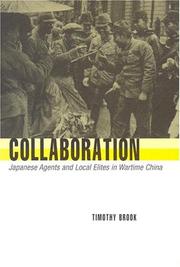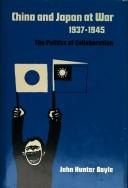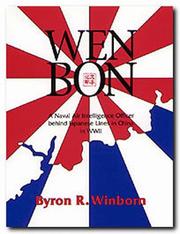| Listing 1 - 10 of 39 | << page >> |
Sort by
|
Book
ISBN: 0674062981 9780674062986 9780674059887 0674059883 Year: 2011 Publisher: Cambridge, Massachusetts
Abstract | Keywords | Export | Availability | Bookmark
 Loading...
Loading...Choose an application
- Reference Manager
- EndNote
- RefWorks (Direct export to RefWorks)
The Japanese invasion of Shanghai in 1937 led some thirty million Chinese to flee their homes in terror, and live-in the words of artist and writer Feng Zikai-"in a sea of bitterness" as refugees. Keith Schoppa paints a comprehensive picture of the refugee experience in one province-Zhejiang, on the central Chinese coast-where the Japanese launched major early offensives as well as notorious later campaigns. He recounts stories of both heroes and villains, of choices poorly made amid war's bewildering violence, of risks bravely taken despite an almost palpable quaking fear.As they traveled south into China's interior, refugees stepped backward in time, sometimes as far as the nineteenth century, their journeys revealing the superficiality of China's modernization. Memoirs and oral histories allow Schoppa to follow the footsteps of the young and old, elite and non-elite, as they fled through unfamiliar terrain and coped with unimaginable physical and psychological difficulties. Within the context of Chinese culture, being forced to leave home was profoundly threatening to one's sense of identity. Not just people but whole institutions also fled from Japanese occupation, and Schoppa considers schools, governments, and businesses as refugees with narratives of their own.Local governments responded variously to Japanese attacks, from enacting scorched-earth policies to offering rewards for the capture of plague-infected rats in the aftermath of germ warfare. While at times these official procedures improved the situation for refugees, more often-as Schoppa describes in moving detail-they only deepened the tragedy.
Book
ISBN: 1612349374 9781612349374 9781612349381 1612349382 9781612349398 1612349390 9781612348537 161234853X Year: 2017 Publisher: [Lincoln]
Abstract | Keywords | Export | Availability | Bookmark
 Loading...
Loading...Choose an application
- Reference Manager
- EndNote
- RefWorks (Direct export to RefWorks)
Sino-Japanese War, 1937-1945 --- Chinese-Japanese War, 1937-1945 --- Japan-China War, 1937-1945 --- Japanese-Chinese War, 1937-1945 --- Second Sino-Japanese War, 1937-1945 --- Sino-Japanese Conflict, 1937-1945 --- Transportation. --- Participation, American. --- Hantzis, James Harvey, --- United States.

ISBN: 0674015630 Year: 2005 Publisher: Cambridge Harvard university press
Abstract | Keywords | Export | Availability | Bookmark
 Loading...
Loading...Choose an application
- Reference Manager
- EndNote
- RefWorks (Direct export to RefWorks)
S04/0825 --- J3386 --- China: History--War against Japan: 1931/1937 - 1945 --- Japan: History -- Gendai, modern -- Shōwa period -- World War II -- war with China (1937-1945) --- Sino-Japanese Conflict, 1937-1945 --- Sino-Japanese War, 1937-1945 --- Collaborationists --- Chinese-Japanese War, 1937-1945 --- Japan-China War, 1937-1945 --- Japanese-Chinese War, 1937-1945 --- Second Sino-Japanese War, 1937-1945

ISBN: 0804708002 Year: 1972 Publisher: Stanford (Calif.): Stanford university press
Abstract | Keywords | Export | Availability | Bookmark
 Loading...
Loading...Choose an application
- Reference Manager
- EndNote
- RefWorks (Direct export to RefWorks)
Sino-Japanese Conflict, 1937-1945 --- -Communism --- -Bolshevism --- Communist movements --- Leninism --- Maoism --- Marxism --- Trotskyism --- Collectivism --- Totalitarianism --- Post-communism --- Socialism --- Village communities --- Chinese-Japanese War, 1937-1945 --- Japan-China War, 1937-1945 --- Japanese-Chinese War, 1937-1945 --- Second Sino-Japanese War, 1937-1945 --- Collaborationists --- Communism --- Sino-Japanese War, 1937-1945 --- Collaborationists. --- -Collaborationists
Book
ISBN: 9780415802307 041580230X 0203959124 1135487324 9781135487324 9780203959121 9781135487393 9781135487461 9780415975117 1135487391 Year: 2013 Volume: *1 Publisher: Hoboken Taylor and Francis
Abstract | Keywords | Export | Availability | Bookmark
 Loading...
Loading...Choose an application
- Reference Manager
- EndNote
- RefWorks (Direct export to RefWorks)
This thesis examines the doctrinal grounds and different approaches to working out this ""new Buddhist tradition,"" a startling contrast to the teachings of non-violence and compassion which have made Buddhism known as a religion of peace. In scores of articles as war approached in 1936-37, new monks searched and reinterpreted scripture, making controversial arguments for ideas like ""compassionate killing"" which would justify participating in war.
War (in religion, folk-lore, etc.) --- War and religion --- Buddhism --- War --- Sino-Japanese War, 1937-1945. --- Chinese-Japanese War, 1937-1945 --- Japan-China War, 1937-1945 --- Japanese-Chinese War, 1937-1945 --- Second Sino-Japanese War, 1937-1945 --- Sino-Japanese Conflict, 1937-1945 --- Buddha and Buddhism --- Lamaism --- Ris-med (Lamaism) --- Religions --- Social aspects --- Religious aspects. --- Religious aspects --- Buddhism.
Book
ISBN: 9780674967670 9780674425538 0674425537 0674967674 9780674425545 9780674425552 9780674425539 0674425553 9780674425552 Year: 2015 Publisher: Cambridge, MA
Abstract | Keywords | Export | Availability | Bookmark
 Loading...
Loading...Choose an application
- Reference Manager
- EndNote
- RefWorks (Direct export to RefWorks)
When Japan invaded China in 1937, Chinese journalists greeted the news with euphoria, convinced their countrymen, led by Chiang Kai-shek, would triumph. Parks Coble shows that correspondents underplayed China’s defeats for fear of undercutting morale and then saw their writings disappear and themselves denounced after the Communists came to power.
Sino-Japanese War, 1937-1945. --- World War, 1939-1945 --- S04/0825 --- Chinese-Japanese War, 1937-1945 --- Japan-China War, 1937-1945 --- Japanese-Chinese War, 1937-1945 --- Second Sino-Japanese War, 1937-1945 --- Sino-Japanese Conflict, 1937-1945 --- China: History--War against Japan: 1931/1937 - 1945 --- China --- History --- Sino-Japanese War, 1937-1945

ISBN: 0585282129 9780585282121 0929398777 9780929398778 Year: 1994 Volume: no. 2 Publisher: [Denton, Tex.] University of North Texas Press
Abstract | Keywords | Export | Availability | Bookmark
 Loading...
Loading...Choose an application
- Reference Manager
- EndNote
- RefWorks (Direct export to RefWorks)
Sino-Japanese War, 1937-1945 --- East Asia --- Regions & Countries - Asia & the Middle East --- History & Archaeology --- Chinese-Japanese War, 1937-1945 --- Japan-China War, 1937-1945 --- Japanese-Chinese War, 1937-1945 --- Second Sino-Japanese War, 1937-1945 --- Sino-Japanese Conflict, 1937-1945 --- Personal narratives, American. --- Winborn, Byron R., --- Wen, Bon,
Book
ISBN: 0674966988 0674735897 9780674735897 9780674728912 0674728912 9780674728912 Year: 2015 Publisher: Cambridge, MA
Abstract | Keywords | Export | Availability | Bookmark
 Loading...
Loading...Choose an application
- Reference Manager
- EndNote
- RefWorks (Direct export to RefWorks)
The Japanese Army committed numerous atrocities during its pitiless campaigns in China from 1931 to 1945. When the Chinese emerged victorious with the Allies at the end of World War II, many seemed ready to exact retribution for these crimes. Rather than resort to violence, however, they chose to deal with their former enemy through legal and diplomatic means. Focusing on the trials of, and policies toward, Japanese war criminals in the postwar period, Men to Devils, Devils to Men analyzes the complex political maneuvering between China and Japan that shaped East Asian realpolitik during the Cold War. Barak Kushner examines how factions of Nationalists and Communists within China structured the war crimes trials in ways meant to strengthen their competing claims to political rule. On the international stage, both China and Japan propagandized the tribunals, promoting or blocking them for their own advantage. Both nations vied to prove their justness to the world: competing groups in China by emphasizing their magnanimous policy toward the Japanese; Japan by openly cooperating with postwar democratization initiatives. At home, however, Japan allowed the legitimacy of the war crimes trials to be questioned in intense debates that became a formidable force in postwar Japanese politics. In uncovering the different ways the pursuit of justice for Japanese war crimes influenced Sino-Japanese relations in the postwar years, Men to Devils, Devils to Men reveals a Cold War dynamic that still roils East Asian relations today.
War crime trials --- War crimes --- World War, 1939-1945 --- Sino-Japanese War, 1937-1945. --- Chinese-Japanese War, 1937-1945 --- Japan-China War, 1937-1945 --- Japanese-Chinese War, 1937-1945 --- Second Sino-Japanese War, 1937-1945 --- Sino-Japanese Conflict, 1937-1945 --- Crime --- Atrocities
Book
ISBN: 9780081020289 0081020287 9780081020272 0081020279 Year: 2017 Publisher: Cambridge, MA : Elsevier,
Abstract | Keywords | Export | Availability | Bookmark
 Loading...
Loading...Choose an application
- Reference Manager
- EndNote
- RefWorks (Direct export to RefWorks)
Contested Memories in Chinese and Japanese Foreign Policy explores the issue of memory and lack of reconciliation in East Asia. As main East Asian nations have never achieved a common memory of their pasts, in particular, the events of the Second World War and Sino-Japanese War, this book locates the issue of memory within International Relations theory, exploring the theoretical and practical link between the construction of a countrys identity and the formation and contestation of its historical memory and foreign policy. -- Amazon.com.
Nationalism and collective memory --- World War, 1939-1945 --- Sino-Japanese War, 1937-1945 --- Influence. --- China --- Japan --- Foreign relations --- Chinese-Japanese War, 1937-1945 --- Japan-China War, 1937-1945 --- Japanese-Chinese War, 1937-1945 --- Second Sino-Japanese War, 1937-1945 --- Sino-Japanese Conflict, 1937-1945 --- Collective memory and nationalism --- Collective memory --- Since 1937
Book
ISBN: 9780674072657 0674072650 0674073975 0674073991 9780674073975 Year: 2013 Publisher: Cambridge, MA
Abstract | Keywords | Export | Availability | Bookmark
 Loading...
Loading...Choose an application
- Reference Manager
- EndNote
- RefWorks (Direct export to RefWorks)
Presented with accounts of genocide and torture, we ask how people could bring themselves to commit such horrendous acts. A searching meditation on our all-too-human capacity for inhumanity, Evil Men confronts atrocity head-on-how it looks and feels, what motivates it, how it can be stopped. Drawing on firsthand interviews with convicted war criminals from the Second Sino-Japanese War (1937-1945), James Dawes leads us into the frightening territory where soldiers perpetrated some of the worst crimes imaginable: murder, torture, rape, medical experimentation on living subjects. Transcending conventional reporting and commentary, Dawes's narrative weaves together unforgettable segments from the interviews with consideration of the troubling issues they raise. Telling the personal story of his journey to Japan, Dawes also lays bare the cultural misunderstandings and ethical compromises that at times called the legitimacy of his entire project into question. For this book is not just about the things war criminals do. It is about what it is like, and what it means, to befriend them. Do our stories of evil deeds make a difference? Can we depict atrocity without sensational curiosity? Anguished and unflinchingly honest, as eloquent as it is raw and painful, Evil Men asks hard questions about the most disturbing capabilities human beings possess, and acknowledges that these questions may have no comforting answers.
Sino-Japanese War, 1937-1945 --- War criminals --- War crimes --- Atrocities --- Psychological aspects --- Psychology --- East Asia. --- Psychological aspects. --- Psychology. --- Crime --- Criminals --- Chinese-Japanese War, 1937-1945 --- Japan-China War, 1937-1945 --- Japanese-Chinese War, 1937-1945 --- Second Sino-Japanese War, 1937-1945 --- Sino-Japanese Conflict, 1937-1945 --- Sino-Japanese War, 1937-1945 - Atrocities - Psychological aspects --- Sino-Japanese War, 1937-1945 - Personal narratives, Japanese --- War criminals - Japan - Interviews --- War criminals - Psychology --- War crimes - Psychological aspects
| Listing 1 - 10 of 39 | << page >> |
Sort by
|

 Search
Search Feedback
Feedback About UniCat
About UniCat  Help
Help News
News